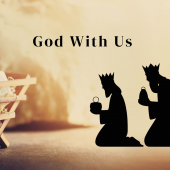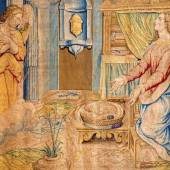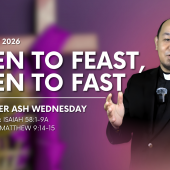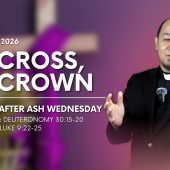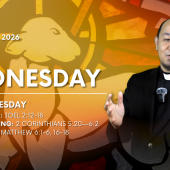The Birth of Jesus foretold
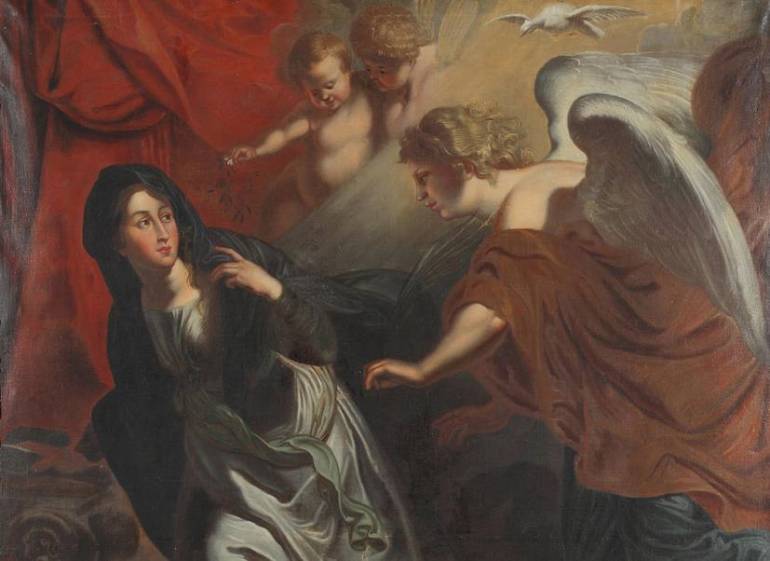
December 20, Monday of the Fourth Week of Advent
Daily Readings: Isaiah 7:10-14 & Luke 1:26-38
In the Old Testament, God performed many signs and miracles to demonstrate his love and mercy for his people, such as their deliverance from slavery in Egypt and the miraculous crossing of the Red Sea on dry land (Psalm 78:43-53). When Ahaz, king of Judah and heir to the throne of David (735 B.C.) was surrounded by forces that threatened to destroy him and his people, God offered him a sign to reassure him that God would not abandon the promise he made to David and his descendants. King Ahaz, however, had lost hope in God and refused to ask for a sign of favor. God, nonetheless, gave a sign to assure his people that he would indeed give them a Savior who would rule with peace and righteousness (Isaiah 7:11ff).
We see the fulfillment of Isaiah's prophecy and the unfolding of God's plan of redemption in the events leading up to the Incarnation, the birth of the Messiah King. The new era of salvation begins with the miraculous conception of Jesus in the womb of Mary. This child to be born is conceived by the gracious action of the Holy Spirit upon Mary, who finds favor with God (Luke 1:28).
As Eve was the mother of all humanity doomed to sin, now Mary becomes the mother of the new Adam who will father new humanity by his grace (Romans 5:12-21). This child to be conceived in her womb is the fulfillment of all God's promises. He will be "great" and "Son of the Most High" and "King," and his name shall be called "Jesus" (Luke 1:31-32), which means "the Lord saves." "He will save his people from their sins" (Matthew 1:21). The angel repeats to Mary, the daughter of the house of David, the promise made to King David: "The Lord God will give him the throne of his father David, and he will reign over the house of Jacob forever; and of his kingdom, there will be no end" (2 Samuel 7:12-16, Isaiah 9:6-7, Luke 1:32-33).
How does Mary respond to the Word of God delivered by the angel Gabriel? She knows she is hearing something beyond human capability. It will surely take a miracle that surpasses all that God has done previously. Her question, "how shall this be, since I have no husband," is not prompted by doubt or skepticism, but by wonderment! She is a true hearer of the Word and she immediately responds with faith and trust.
Mary's prompt response of "yes" to the divine message is a model of faith for all believers. Mary believed in God's promises even when they seemed impossible. She was full of grace because she trusted that what God said was true and would be fulfilled. She was willing and eager to do God's will, even if it seemed difficult or costly. Mary is the "mother of God" because God becomes incarnate when he takes on flesh in her womb. When we pray the Nicene Creed, we state our confession of faith in this great mystery: "For us men and our salvation he came down from heaven; by the power of the Holy Spirit, he became incarnate of the Virgin Mary, and was made man."
If we say "yes" to God, we can live a grace-filled life
God gives us grace, and he expects us to respond with the same willingness, obedience, and heartfelt trust as Mary did. When God commands, he also gives the help, strength, and means to respond. We can either yield to his grace or resist and go our own way. Do you believe in God's promises and do you yield to his grace?
The Annunciation to Mary begins our immediate preparation for the coming of Jesus among us. There was fear at the surprising call, leading to a question of how this could happen. Then there was a sign that Elizabeth was expecting a child before Mary said 'yes.' She did not say "ok, I will do it," but "let it be with me according to your word." It was 'yes' to a way of life, a 'yes' to the Word of God, leaving the initiative with God.
Surprising calls can evoke fears and questioning, leading to a desire for a sign before saying yes. Have I been through that experience? In my prayer, I ask for Mary's freedom and openness to God's surprising ways? Could my fears get in the way of a generous response to God?
Source: dailyscripture.net
Radio Veritas Asia (RVA), a media platform of the Catholic Church, aims to share Christ. RVA started in 1969 as a continental Catholic radio station to serve Asian countries in their respective local language, thus earning the tag “the Voice of Asian Christianity.” Responding to the emerging context, RVA embraced media platforms to connect with the global Asian audience via its 21 language websites and various social media platforms.










